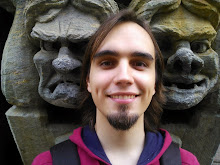“In Defense of Naïve Reading” by Robert Pippin is a pretty interesting integrative article on literary postmodernism published at the New York Times website. Reading it was as if the surfaces of the Red Postmodern Sea were parted and the depth of self-consciousness revealed itself. At least for a moment a silent green beam of hope shined. To quote,
“[L]iterature and the arts have a dimension unique in the academy, not shared by the objects studied, or ‘researched’ by our scientific brethren. They invite or invoke, at a kind of ‘first level,’ an aesthetic experience that is by its nature resistant to restatement in more formalized, theoretical or generalizing language. This response can certainly be enriched by knowledge of context and history, but the objects express a first-person or subjective view of human concerns that is falsified if wholly transposed to a more ‘sideways on’ or third-person view. Indeed that is in a way the whole point of having the ‘arts.’”
For me, literature has always been a source of deep wisdom that fosters one’s greater maturity. As a brilliant Russian thinker Vasily Nalimov argues in his books, consciousness is a text-reading phenomenon (in the broadest sense of the word). In my opinion, narrative brings meaningful & very subtle structures to one’s personal development; and Ken Wilber has pointed out the importance of the world greatest religious narratives as developmental conveyor belts for preconventional & conventional worldspaces in his book Integral Spirituality.
To continue quoting this wonderful article,
“Likewise—and this is a much more controversial thesis—such works also can directly deliver a kind of practical knowledge and self-understanding not available from a third person or more general formulation of such knowledge. There is no reason to think that such knowledge—exemplified in what Aristotle said about the practically wise man (the [Phronēsis]) or in what Pascal meant by the difference between l’esprit géometrique and l’esprit de finesse—is any less knowledge because it cannot be so formalized or even taught as such. Call this a plea for a place for ‘naïve’ reading, teaching and writing—an appreciation and discussion not mediated by a theoretical research question recognizable as such by the modern academy.”
Definitely, aesthetically-built literary narratives seem to have the capacity of constructing experiential frameworks for conveying certain domains of tacit knowledge (necessary for action learning in the pragmatic sector). To additionally contribute to this statement about the importance of aesthetics in our narratives, I would quote the famous Russian writer Anton Chekhov who said, “The writer’s function is only to describe by whom, how, and under what conditions… The artist must be only an impartial witness of his characters and what they said, not their judge.” (I borrowed the quotation from another interesting article by Nina Schuyler.)
Here are some of the questions worth pondering. Why reading comprehensive literature is so important for our development? Why do I think that in order for us to contribute to humanity probably the best thing we can do is to calm our minds enough to be able to actually have read Dostoevsky’s passionate reflections on universal conscience and self-liberation? Why do stories and their archetypal images have played such an important role for our humanity’s evolution for millennia? Why good 1st-person storytelling is so important not just for narrow marketing and cheap sales pitches but for a wide range of dimensions of life that involve communication and knowledge sharing?
One of the many perspectives that I find increasingly important when contemplating the matrix of these questions is the mind-blowing neuroscientific discovery of mirror neurons:
Here are some of the questions worth pondering. Why reading comprehensive literature is so important for our development? Why do I think that in order for us to contribute to humanity probably the best thing we can do is to calm our minds enough to be able to actually have read Dostoevsky’s passionate reflections on universal conscience and self-liberation? Why do stories and their archetypal images have played such an important role for our humanity’s evolution for millennia? Why good 1st-person storytelling is so important not just for narrow marketing and cheap sales pitches but for a wide range of dimensions of life that involve communication and knowledge sharing?
One of the many perspectives that I find increasingly important when contemplating the matrix of these questions is the mind-blowing neuroscientific discovery of mirror neurons:
“In multiple reports published in the Sept. 19 issue of Current Biology, neuroscientists provide evidence that mirror neurons are multimodal—they are activated by not just by watching actions, but also by hearing and reading about them.
An effort led by Lisa Lisa Aziz-Zadeh, a neuroscientist at the University of Southern California, found that the brain’s premotor cortex shows the same activity when subjects observe an action as when they read words describing it.” (“Mirror Neurons Also Respond to Language and Sound,” September 21, 2006)
Hence, we are witnessing the capacity of comprehensive narratives to evoke altered states of consciousness and deeper modes of knowing and appreciating life which are important for the emergence of a more sophisticated pragmatics of our being-in-the-world. Science cannot replace art and morals—Habermas, Wilber and others have proved it convincingly; but if science, morals, and art are in a complementary relationship with each other their synergy will most definitely bring forth powerful results.








